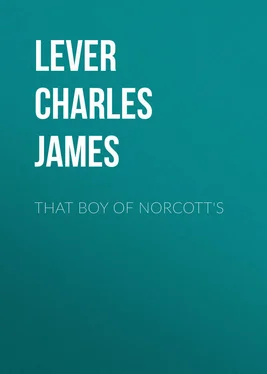Charles Lever - That Boy Of Norcott's
Здесь есть возможность читать онлайн «Charles Lever - That Boy Of Norcott's» — ознакомительный отрывок электронной книги совершенно бесплатно, а после прочтения отрывка купить полную версию. В некоторых случаях можно слушать аудио, скачать через торрент в формате fb2 и присутствует краткое содержание. Издательство: Иностранный паблик, Жанр: literature_19, foreign_antique, foreign_prose, на английском языке. Описание произведения, (предисловие) а так же отзывы посетителей доступны на портале библиотеки ЛибКат.
- Название:That Boy Of Norcott's
- Автор:
- Издательство:Иностранный паблик
- Жанр:
- Год:неизвестен
- ISBN:нет данных
- Рейтинг книги:4 / 5. Голосов: 1
-
Избранное:Добавить в избранное
- Отзывы:
-
Ваша оценка:
- 80
- 1
- 2
- 3
- 4
- 5
That Boy Of Norcott's: краткое содержание, описание и аннотация
Предлагаем к чтению аннотацию, описание, краткое содержание или предисловие (зависит от того, что написал сам автор книги «That Boy Of Norcott's»). Если вы не нашли необходимую информацию о книге — напишите в комментариях, мы постараемся отыскать её.
That Boy Of Norcott's — читать онлайн ознакомительный отрывок
Ниже представлен текст книги, разбитый по страницам. Система сохранения места последней прочитанной страницы, позволяет с удобством читать онлайн бесплатно книгу «That Boy Of Norcott's», без необходимости каждый раз заново искать на чём Вы остановились. Поставьте закладку, и сможете в любой момент перейти на страницу, на которой закончили чтение.
Интервал:
Закладка:
“And what is your name, pray?”
“Nixon, sir. Mr. Nixon, Sir Roger is pleased to call me for distinction’ sake; the lower servants require it.”
“Tell me then, Mr. Nixon, who are the two gentlemen I saw at breakfast outside?”
“The stoutish gentleman, sir, is Captain Hotham, of the Royal Navy; the other, with the Turkish pipe, is Mr. Cleremont, Secretary to the Legation here. Great friends of Sir Roger’s, sir. Dine here three or four times a week, and have their rooms always kept for them.”
The appearance of my room, into which Nixon now ushered me, went far to restore me to a condition of satisfaction. It was the most perfect little bedroom it is possible to imagine, and Nixon never wearied in doing the honors of displaying it.
“Here’s your library, sir. You’ve only to slide this mirror into the wall; and here are all your books. This press is your armory. Sir Roger gave the order himself for that breech-loader at Liège. This small closet has your bath, – always ready, as you see, sir, – hot and cold; and that knob yonder commands the shower-bath. It smells fresh of paint here just now, sir, for it was only finished on Saturday; and the men are coming to-day to fix a small iron staircase from your balcony down to the garden. Sir Roger said he was sure you would like it.”
I was silent for a moment, – a moment of exquisite revery, – and then I asked if there were always people visitors at the Villa.
“I may say, sir, indeed, next to always. We haven’t dined alone since March last.”
“How many usually come to dinner?”
“Five or seven, sir; always an odd number. Seldom more than seven, and never above eleven, except a state dinner to some great swell going through.”
“No ladies, of course?”
“Pardon me, sir. The Countess Vander Neeve dined here yesterday; Madam Van Straaten, and Mrs. Cleremont – Excuse me, sir, there’s Sir Roger’s bell. I must go and tell him you’ve arrived.”
When Nixon left me, I sat for full twenty minutes, like one walking out of a trance, and asking myself how much was real, and how much fiction, of all around me?
My eyes wandered over the room, and from the beautiful little Gothic clock on the mantelpiece to the gilded pineapple from which my bed-curtains descended, – everything seemed of matchless beauty to me. Could I ever weary of admiring them? Would they seem to me every morning as I awoke as tasteful and as elegant as now they appeared to me? Oh, if dear mamma could but see them! If she but knew with what honor I was received, would not the thought go far to assuage the grief our separation cost her? And, last of all, came the thought, if she herself were here to live with me, to read with me, to be my companion as she used to be, – could life offer anything to compare with such happiness? And why should not this be? If papa really should love me, why might I not lead him to see to whom I owed all that made me worthy of his love?
“Breakfast is served, sir, in the small breakfast-room,” said a servant, respectfully.
“You must show me where that is,” said I, rising to follow him.
And now we walked along a spacious corridor, and descended a splendid stair of white marble, with gilded banisters, and across an octagon hall, with a pyramid of flowering plants in the centre, and into a large gallery with armor on the walls, that I wished greatly to linger over and examine, and then into a billiard-room, and at last into the small breakfast-parlor, where a little table was laid out, and another servant stood in readiness to serve me.
“Mr. Eccles, sir, will be down in a moment, if you ‘ll be pleased to wait for him,” said the man.
“And who is Mr. Eccles?” asked I.
“The gentleman as is to be your tutor, sir, I believe,” replied he, timidly; “and he said perhaps you ‘d make the tea, sir.”
“All right,” said I, opening the caddy, and proceeding to make myself at home at once. “What is here?”
“Devilled kidneys, sir; and this is fried mackerel. Mr. Eccles takes oysters; but he won’t have them opened till he’s down. Here he is, sir.”
The door was now flung open, and a good-looking young man, with a glass stuck in one eye, entered, and with a cheery but somewhat affected voice, called out, —
“Glad to see you, Digby, my boy; hope I have not starved you out waiting for me?”
“I’m very hungry, sir, but not quite starved out,” said I, half amazed at the style of man selected to be my guide, and whose age at most could not be above three or four and twenty.
“You haven’t seen your father yet, of course, nor won’t these two hours. Yes, Gilbert, let us have the oysters. I always begin with oysters and a glass of sauterne; and, let me tell you, your father’s sauterne is excellent Not that I counsel you , however, to start with wine at breakfast. I have n’t told you that I ‘m to be your tutor,” said he, filling his glass; “and here’s to our future fellowship.”
I smiled and sipped my tea to acknowledge the toast, and he went on, —
“You mustn’t be afraid that I ‘ll lean too heavily on you, Digby, – at least, at first. My system is, never make education a punishment. There’s nothing that a gentleman – mind, I say a gentleman – ought to know that he cannot acquire as easily and as pleasantly as he does field-sports. If a man has to live by his wits, he must drudge; there’s no help for it. And – But here come the oysters. Ain’t they magnificent? Let me give you one piece of instruction while the occasion serves; let no one ever persuade you that Colchester oysters equal the Ostend. They have neither the plumpness nor the juiciness, and still less have they that fresh odor of the sea that gives such zest to appetite. One of these days I shall ask you what Horace says of oysters, and where. You never heard of Horace, eh?”
“Yes, sir; I was reading the ‘Odes’ when I came away.”
“And with whom, pray?”
“With mamma, sir.”
“And do you mean to say mamma knew Latin?”
“Yes, sir; she learned it to teach me. She worked far harder than I did, and I could never come up with her.”
“Ah, yes, I see; but all that sort of learning – that irregular study – is a thing to be grubbed up. If I were to be frank with you, Digby, I ‘d say I ‘d rather have you in total ignorance than with that smattering of knowledge a mamma’s teaching is sure to imply. What had you read before Horace?”
“‘Caesar’s Commentaries,’ sir, an ‘Æneid’ of Virgil, two plays of Terence – ”
“Any Greek? – anything of Euripedes or Aristophanes, eh?” asked he, mockingly.
“No, sir; we were to begin the New Testament after the holidays; for I had just gone over the grammar twice.”
“With mamma, of course?”
“Yes, sir.”
He helped himself to a cutlet, and as he poured the Harvey’s sauce over it, it was plain to see that he was not thinking of what was before him, but employed in another and different direction. After a considerable pause he turned his eyes full upon me, and with a tone of far more serious import than he had yet used, said, “We ‘re not very long acquainted, Digby; but I have a trick of reading people through their faces, and I feel I can trust you.” He waited for some remark from me, but I made none, and he went on: “With an ordinary boy of your age, – indeed, I might go farther, and say with any other boy – I ‘d not venture on the confidence I am now about to make; but a certain instinct tells me I run no danger in trusting you .”
“Is it a secret, sir?”
“Well, in one sense it is a secret; but why do you ask?”
“Because mamma told me to avoid secrets; to have none of my own, and know as little as I could of other people’s.”
Читать дальшеИнтервал:
Закладка:
Похожие книги на «That Boy Of Norcott's»
Представляем Вашему вниманию похожие книги на «That Boy Of Norcott's» списком для выбора. Мы отобрали схожую по названию и смыслу литературу в надежде предоставить читателям больше вариантов отыскать новые, интересные, ещё непрочитанные произведения.
Обсуждение, отзывы о книге «That Boy Of Norcott's» и просто собственные мнения читателей. Оставьте ваши комментарии, напишите, что Вы думаете о произведении, его смысле или главных героях. Укажите что конкретно понравилось, а что нет, и почему Вы так считаете.












